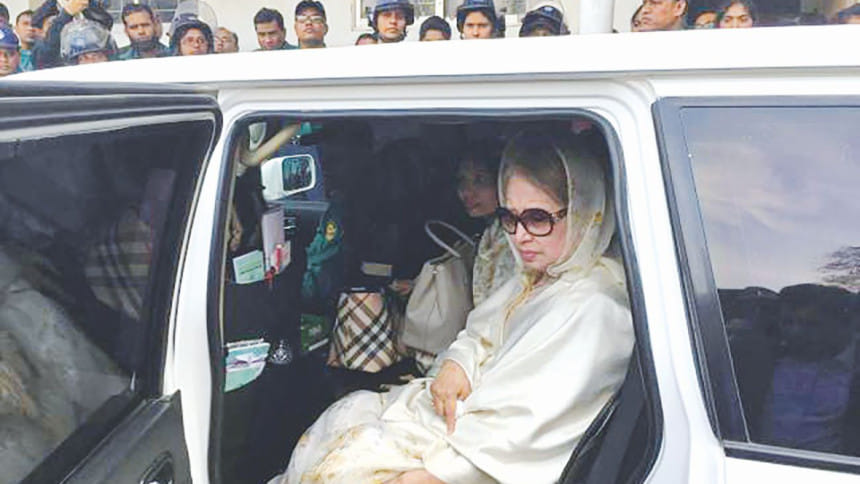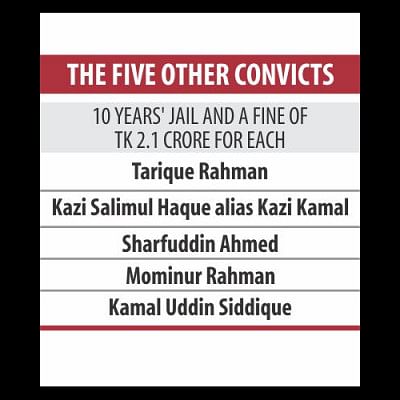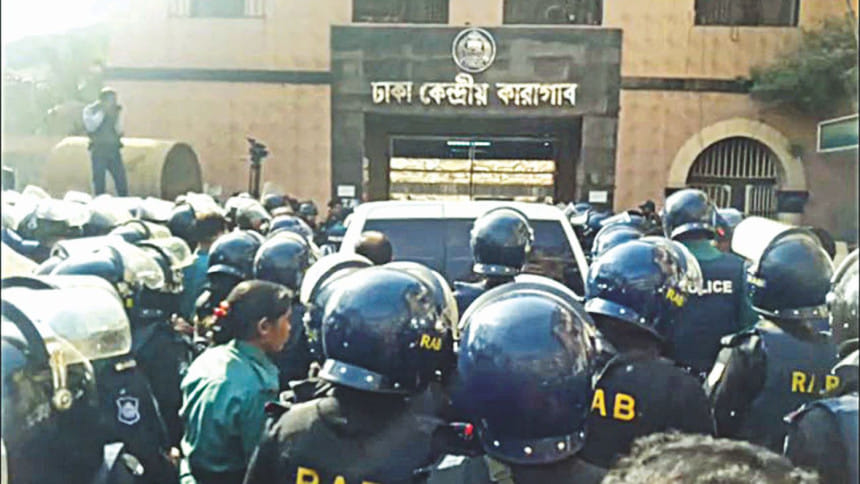Khaleda lands in jail

BNP Chairperson Khaleda Zia landed in jail yesterday after a special court sentenced her to five years' rigorous imprisonment in a graft case, dealing a severe blow to the party ahead of the upcoming national elections.
The three-time prime minister is the second former head of government after ex-dictator HM Ershad to have been convicted on corruption charges.
The verdict in the Zia Orphanage Trust corruption case came amid heightening tension that kept people's nerves on edge over the last few days.
The BNP chief's conviction could have significant political implications as it makes uncertain her participation in the next national polls slated for later this year.
"As the prosecution has been able to prove the charges against Khaleda Zia, she has been awarded five years' rigorous imprisonment, considering her social status and physical condition," said Judge Md Akhtaruzzaman of the Special Court-5 in Dhaka, delivering the much-talked about verdict in a packed courtroom.

The court cancelled Khaleda's bail and sent her to prison. Law enforcers then took her to the old Central Jail on Nazimuddin Road in the capital amid tight security around 3:00pm.
The BNP chief now faces 33 more cases filed with different courts and police stations across the country.
The special court also sentenced Khaleda's eldest son and BNP Senior Vice Chairman Tarique Rahman, and four others to 10 years' rigorous imprisonment and slapped a fine of Tk 2.10 crore each.
Tarique, who resides in the UK, was tried in absentia. Earlier in July 2016, he had been awarded seven years' imprisonment in a money laundering case.
As per the BNP charter, he will perform as chairman of the 40-year-old political party in Khaleda's absence.
The other convicts are Kazi Salimul Haque, an ex-BNP lawmaker from Magura; Sharfuddin Ahmed, a businessman; Mominur Rahman, a cousin of Tarique; and Kamal Uddin Siddique, former principal secretary.
Of them, Mominur and Kamal are on the run while Salimul and Sharfuddin were sent to jail yesterday. The sentence of the fugitives will be effective from the day of their arrest or surrender.
Tension ran high centring the verdict. The government deployed a huge number of law enforcers and paramilitary forces in the capital and elsewhere to prevent BNP activists from staging demonstrations.
Sporadic violence erupted in the capital and some other parts of the country before and after the pronouncement of the judgment, which BNP leaders described as "completely politically motivated". They said they will appeal against it.
Meanwhile, the prosecution and the ruling Awami League said no one is above the law, and this has been proved through the judgment.
WHAT NOW?
Khaleda, now 72, will have to stay in jail for at least three days until Sunday. Her lawyers will be able to move to the High Court on Sunday seeking her bail and stay on the sentence only if they get a certified copy of the verdict by that time.
The BNP chief will have the chance to file an appeal with the HC within 30 days of receipt of the verdict.
Her lawyers applied for a certified copy of the verdict yesterday but they are yet to get it.
BNP leader Moudud Ahmed, also a counsel for Khaleda, told reporters that they will file an appeal on Sunday if they get a copy of the verdict.

If there is any delay in getting the certified copy, it will hold back the bail process.
But the bigger question is whether she will be able to contest the upcoming general elections scheduled for December this year.
According to the law, if someone is convicted and sentenced to at least two years' imprisonment, he or she cannot take part in any election for the next five years.
In Khaleda's case, if the HC grants her bail but upholds the sentence, she will be disqualified from running for election. But if the court stays the sentence, she will be able to take part in the election.
It will be up to the HC whether it will grant her bail or not.
"We have already applied for a certified copy of the judgment. Once we get it, we will file an appeal with the High Court seeking a stay [of the verdict] and bail for Khaleda Zia," Khandaker Mahbub Hossain, a senior counsel for her, told reporters after the verdict.
In her 35 years of political career, the BNP chief has never been convicted in a lawsuit.
Khaleda, the first female prime minister of country, was made vice chairperson of BNP in March 1983 after the assassination of her husband president Ziaur Rahman.
She became the party chairperson on May 10, 1984, and has been holding the post since then.
The BNP chief was kept in prison for about a year on corruption charges during the tenure of the last caretaker government. She had also been detained a few times during the mass movement against autocrat HM Ershad in the 1980s and in 1990.
Ershad had been in jail after being convicted in two graft cases -- Janata Tower and Japanese Boat Purchase -- during the BNP-led government's tenure in 1991-1996. He was disqualified from contesting the 2001 national polls after the HC upheld his conviction in Janata Tower graft case in 2000.
THE CASE AND THE VERDICT
The Anti-Corruption Commission had filed the graft case with Ramna Police Station in July 2008, accusing Khaleda and five others of misappropriating over Tk 2.1 crore that had come from a foreign bank as grants for orphans.
According to the case documents, during her stint as PM between 1991 and 1996, Khaleda opened a bank account by the name “Prime Minister's Orphanage Trust”. Later, the Zia Orphanage Trust was set up by her two sons and a nephew in 1993.
A total of Tk 2,33,33,500 was given to the Zia Orphanage Trust from the “Prime Minister's Orphanage Trust” in November, 1993, to establish an orphanage in Bogra.
The money was deposited in a bank account of the Zia trust on November 15 that year, and Tk 4 lakh was withdrawn from there. Of the amount, Tk 2.77 lakh was spent on buying 2.79 acres of land in Bogra's Gabtoli against the name of Zia Orphanage Trust.
In 13 years between 1993 and April 2006, there was no activity of the trust and the amount deposited in the trust account grew to Tk 3.37 crore with accrued interest.
Later, the money was transferred to bank accounts of three other accused -- Salimul, Mominur and Sharfuddin -- through different transactions, reads the first information report.
The accused misappropriated the money by transferring the amount from a public fund to a private one, it said.
Upon the conclusion of the trial proceedings in the case, the special court in the capital's Bakshibazar on January 25 set February 8 for delivering the judgment.
Since then, there has been a lot of buzz in the political arena centring the verdict.
The BNP held a series of meetings to fix its next course of action in case their party chief was convicted.
The Awami League, on the other hand, had discussions at different party forums and prepared to face the BNP if it tries to take to the streets and assist law enforcers in maintaining law and order.
Law enforcers took massive security measures and set up checkpoints at all points of entry to the capital. They also carried out raids on messes, hotels and houses of BNP leaders and workers. Police also arrested dozens of BNP men in the last several days.
Yesterday, the capital wore a deserted look with a few public vehicles plying the streets.
Since morning, a huge number of journalists gathered at the Bakshibazar intersection, some 100 metres from the special court premises. Security personnel allowed them in only after 9:00am upon body search.
Television camerapersons and photographers, however, were not allowed to enter the court premises. Apart from a few exceptions, the security personnel didn't let in more than one reporter of a media house.
Some defence lawyers alleged that many of their colleagues were not allowed to enter.
Though the BNP's press wing said on Wednesday that Khaleda would start for the court from her Gulshan house around 10:00am, she left home around noon yesterday.
Earlier, two other accused -- Salimul and Sharfuddin -- were brought to the court by a prison van around 9:00am.
The judge reached the court around 10:20am under police protection.
Meanwhile, both the prosecution and the defence lawyers had arrived at the court and kept waiting for Khaleda.
BNP senior leaders, including its Secretary General Mirza Fakhrul Islam Alamgir, arrived at 1:35pm.
Khaleda reached the court at 1:52pm. Her arrival was delayed as a huge number of BNP men escorted her vehicle. It had to slow down at several points where many supporters gathered to get a glimpse of her.
She sat on a chair next to a tea table. A tissue box and a bottle of water were kept on it for her.
As Judge Md Akhtaruzzaman took seat at 2:13pm, defence counsel Abdur Rezak Khan told him something in a low voice. The judge then asked all the private security personnel to leave the courtroom, and the BNP chief's security personnel obliged.
He then read out a summary of the 632-page judgment.
During the pronouncement of the verdict, the judge mentioned 11 points that he took into consideration in reaching the decision in the case.
He also noted that it took quite a long time to dispose of the case because the defence went to higher court on several occasions, challenging the trial court's orders.
The judge mentioned that Khaleda had filed 39 time petitions in the last one year.
The BNP chief kept her eyes closed most of the time during the delivery of the verdict.
As the judge left the courtroom around 2:30pm, two defence lawyers shouted "no, no".
Within moments, police personnel surrounded Khaleda, and prevented others from going near her.
Senior BNP leaders, including Fakhrul, Nazrul Islam Khan and Khandaker Mosharraf Hossain looked gloomy. Some of the party leaders were seen crying after the verdict.
The defence lawyers then got locked into a noisy argument with law enforcers inside the courtroom, saying they wanted to speak to Khaleda. Later, a group of lawyers, including Moudud Ahmed and Jamir Uddin Sircar, were allowed to talk to the BNP chief for around 10 minutes.
After a while, Khaleda was taken to the jail by a white sport utility vehicle at about 2:50pm amid tight security.
ACC Public Prosecutor Mosharraf Hossain Kajal told journalists at the courtroom that they proved the charges against Khaleda and five other accused beyond doubt, and they are satisfied with the verdict.
Abdur Rezak Khan, a senior defence lawyer, said Khaleda was convicted in a "false" case, and that the awarding of rigorous imprisonment to a 72-year-old person was "unjust".
"She didn't misappropriate even a single penny meant for orphans. We will challenge it at the High Court soon after getting the certified copy of the judgment," he added.

 For all latest news, follow The Daily Star's Google News channel.
For all latest news, follow The Daily Star's Google News channel. 





Comments